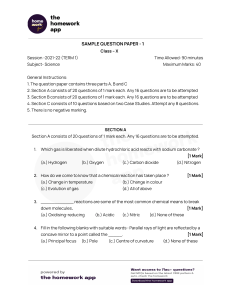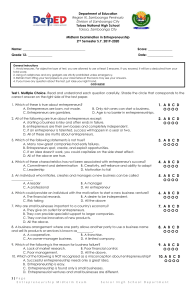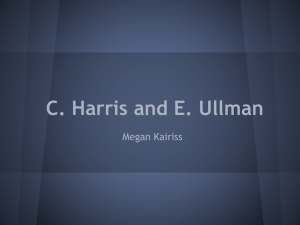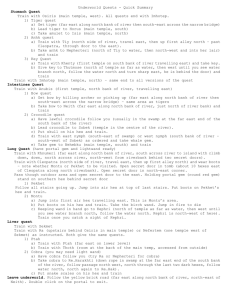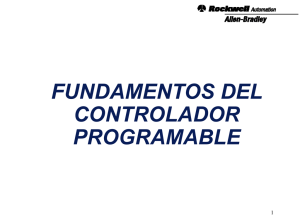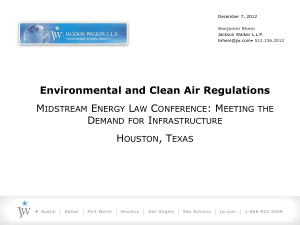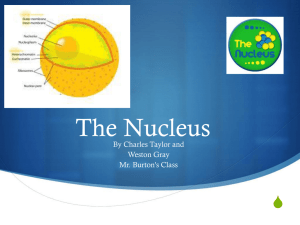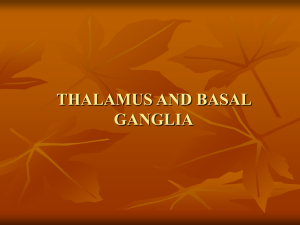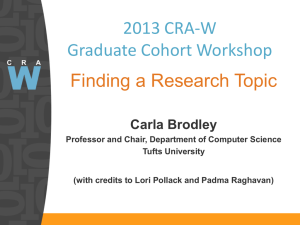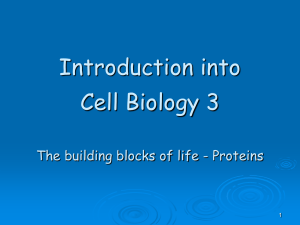Full text - Universiteit Utrecht
advertisement
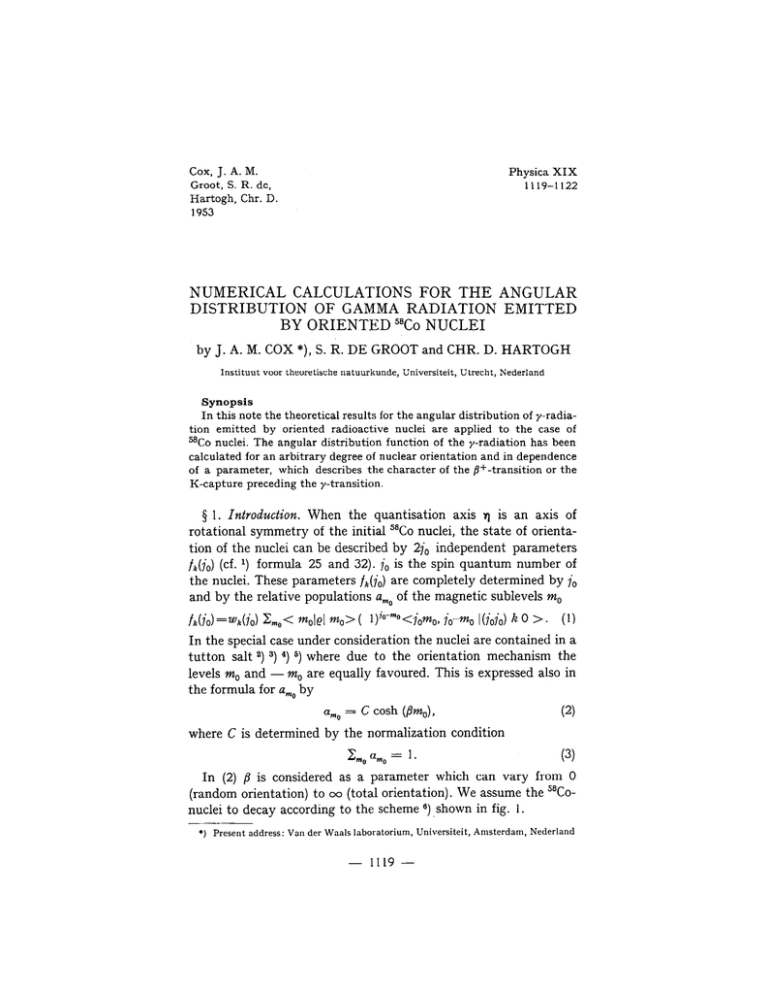
Cox, J. A. M. Groot, S. R. de, Hartogh, Chr. D. 1953 NUMERICAL DISTRIBUTION Physica XIX 1119-1122 CALCULATIONS FOR THE OF GAMMA RADIATION BY ORIENTED “Co NUCLEI ANGULAR EMITTED by J. A. M. COX *), S. R. DE GROOT and CHR. D. HARTOGH Instituut voor theoretische natuurkunde, Universiteit, Utrecht, Nederland Synopsis In this note the theoretical results for the angular distribution of y-radiation emitted by oriented radioactive nuclei are applied to the case of 5sCo nuclei. The angular distribution function of the y-radiation has been calculated for an arbitrary degree of nuclear orientation and in dependence of a parameter, which describes the character of the /If-transition or the K-capture preceding the y-transition. 5 1. Introduction. When the quantisation axis ‘1 is an axis of rotational symmetry of the initial “Co nuclei, the state of orientation of the nuclei can be described by 2j,, independent parameters fk(j,,) (cf. ‘) formula 25 and 32). j0 is the spin quantum number of the nuclei. These parameters f&) are completely determined by j,, and by the relative populations LZ,,,~ of the magnetic sublevels m, fkm=~k(io) zn,< f%lel %>(-uia-mo-G3+%~ io-?I Ihio) k 0 >. (1) In the special case under consideration the nuclei are contained in a tutton salt “) “) “) “) wh ere due to the orientation mechanism the levels m, and - m, are equally favoured. This is expressed also in the formula for a,, by a m0 = C cash (j3nz0), where C is determined by the normalization c m0 atno=l (4 condition - (3) In (2) p is considered as a parameter which can vary from 0 (random orientation) to CXJ(total orientation). We assume the “COnuclei to decay according to the scheme “) ,shown in fig. 1. ~l ) Present address: Van der Waals laboratorium, - 1119 - Universiteit, Amsterdam, Nederland 1120 J. A. &I. COX, S. R. DE GROOT AND CHR. D. HARTOGH For the calculation of the angular distribution radiation we can use the formula (cf. i) formula of the y quadrupole 93) w(6)=2[1-(+)N21ii) fdfii) fifii) p2(cos8.)k55N4(ii) p4 lcos s)l9 C4) where 6, is the angle between the direction of emission k of the y-quantum and q. The functions P, (cos 6) and P, (cos 6) are normalized Legendre polynomials. The distribution function W(6) is normalized to J-W(S) df2 = 87~. (5) In order to find the distribution function (4) we have calculated the orientation parameters fk(ji) from the initial parameters fk(jO) before the flf-transition or K-capture. The relation between them is given by (cf. ‘) formulae 28, 29) SEC0 fZ(ii) = 4 (* fd(ii) = 4 (- + I) 2 + (6) f2(jO)p 5il) ---J--J f4bO)* (7) Kwcopt”;;: 1 !Y “Fe Fig. A 1. Decay-scheme jf= 0 of 5BCo. Here il (0 < I < 1) is a parameter, which describes the character of the transition j0 -+ ii. When this process is determined by the squared nuclear matrix element I/ 11’ the parameter 1= 1 (Fermi type interaction). For Gamow-Teller interaction only [/crj” occurs and then Iz = 0. Ultimately we obtain an expression for. W(6) which depends on the parameters /? and 1. The procedure of the calculations and the numerical results will be given in section 2. 9 2. Procedure of the calculations and numerical results. Since only fR with k even are needed we can use instead of (2) the Boltzmann distribution 4Q = C exp (pm,). (8) GAMMA RADIATION EMITTED BY ORIENTED 58c0 1121 NUCLEI We have calculated a,,,0 for several values of /? (0 + m). With these values f&,) and f,&) are calculated from (1) with the quantum number i0 = 2 for 58Co (fig. 1). With (6) and (7) this leads to the parameters fi(ii) and f4(ji). If we write formula (4) as W(6) = 2 [ 1 - &(A, p) P, (cos 8) - C,(l, /?) P, (cos 6) -J (9) it is now possible to evaluate the coefficients &(A, ,!?) and C,(I, fi). In the table the results for these coefficients have been given as a function of p for values of ;Z = 0, 4 and 1. On account of the strong dependence on il it might be possible to determine 1 experimentally as has been indicated before (cf. “) pages 8 and 9). TABLE J0 0,04 0,os 0,lO 0,15 0,20 0,25 0,30 0,35 0,40 0,45 0,50 0,55 0.60 0,70 0,80 0,90 I .oo I,25 I ,50 I ,75 w 2,5 3,O 4,O 580 co Jlasimum l&cc-ived Physica c‘, (0, B) o,oooo Cd (0, B) -o,oooo -o,oooo -o,oooo -o,oooo -o,oooo -0,000 I 0,0004 0,0006 O,OG25 0,0055 0,0098 0,o 150 0,0213 0,0284 0,0363 0,0449 0,054o 0,0635 0,0733 0,0936 -0,0001 -0,0003 -0,0005 -0,0009 -0,0013 -0,0020 -0.0028 -0,0038 -0,0064 -0,0098 --0,0142 -0,0193 -0,0353 -0,0539 -0,0734 -0,092l -0,124l -0, I475 -0, I737 0,l I40 0,134o 0,1532 0,196s 0.2320 0,2601 0,282O 0,312l 0,330 I 0,3473 0,353s 0,357 I error -0,184l -0,1905 I unit of the last I c* tt,/% o,oooo 0,0006 0,0009 0,0037 0,0083 0,O I46 0,0225 0,0319 0,0426 0,0545 0,0673 0,081O 0,0953 0,1100 0,1403 0,1709 0,201o 0,2298 0.2947 0,3479 0,390l 0,423O 0,468 I 0,495 I 0,5209 0,5303 0.5357 I Cd ct, B) o,oooo o,oooo o,oooo o,oooo o,oooo o,oooo o,oooo 0,0001 0,000 I 0,0002 0,0003 0,0005 0,0007 0,0010 0.00 I6 0.0025 0,0035 0,0048 0,0088 0,0135 0,0183 0,023O 0,031o 0,0369 0,0434 0,046O 0.0476 C*Cl,B) o,oooo 0,0008 0,oo I2 0,005o 0,Ol I I 0,019s 0,030 I 0,0426 0,0569 0,0727 0.0898 0,108O 0,127O 0,1467 0,187l 0,2279 0,268O 0,306s 0,393o 0,4639 0,520 I 0,564O 0,6242 0,660 I 0,694s 0,707o 0,7143 (‘6 (l,B, o,oooo o,oooo o,oooo o,oooo 0.0000 0,000 I 0,0002 0.0004 0,0008 0,0013 0,002o 0,0029 0,004 I 0,0058 0,0095 0,o I47 0,0213 0.0290 0,0529 0,0809 0,I 100 0,138l 0,1862 0,2213 0,2605 0,2762 0,2857 decimal. 22-8-53. S 1N 71 1122 GAMMA RADIATION EMITTED BY ORIENTED 58cO NUCLEI REFERENCES 1) 2) 3) 4) 5) 6) 7) Tolhoek, H.A.and Cos, J.A.BI.,Physical~(l953) 101. D a n i e 1 s, J. M., G r a c e, M. A. and R o b i n s on, F. N. H., Nature, Lolldoll 188 (1951) 780. Garter, C. J., \‘ersl. Kon. Ned. Akad. Wet. 1R (1951) 104; Garter, C. J.. Poppema, 0. J., Steenland, M. J. and B e u II, J. A., Physica, Amstcrdam 17 (1951) 1050. Go r t e r, C. J., To 1 hoe k, H. A., Pop p e m a, 0. J., S teen 1 an cl, bl. Jand B c u n, J. A., Physica 18 (1952) 135. Bishop, G. R., Daniels, J. M., Goldschmidt, G., Halban, H., I< u r t i, N., and R o b i n s o n, F. N. H., Phys. Rev. 88 (1952) 1432. D a n i e 1 s, J. M., G r ace, M. A., H a 1 b a n, H., K u r t i, N. and R o b i ns o n, F. N. H., Phil. Mag. 43 (1952) 1297. C o x, J. A. M. and T o 1 h o e k, H. A., Physica i’J (1953) 673.
